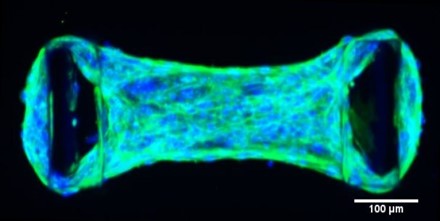MSc thesis project proposal
Electrodes for Engineered Heart Tissue-on-Chip
Organ-on(-a)-chip (OoC) is an emerging technology which aims at recreating the smallest functional units of human organs on a microfluidic device. The main goal of OoC is to improve the drug development process and possibly enable a personalized health care system in the future. One of the most important target organs is certainly the heart. The heart is not just the only muscle working during humans’ entire lifetime: cardiovascular diseases are the most common cause of death globally, and cardiotoxicity is a prevalent cause of drug withdrawal.
Engineered heart tissue (EHT) is a promising platform for the growth and study of heart tissues. It consists of two or more anchoring points (i.e., pillars) around which the tissue self-assembles. There then occurs the need for introducing different mechanical and electrical stimuli to recreate a physiologically relevant native tissue microenvironment.
This project aims to integrate electrodes for stimulation of cardiomyocytes on an EHT platform.
Assignment
This experimental project will involve:
• Literature survey: Research on the current methods for electrical stimulation of cardiomyocytes and the materials used for electrodes;
• Design: Analysis and simulation of the electrodes according to biological and technological constraints;
• Microfabrication: Integration of the electrodes within the existing platform;
• Characterisation: Electrical characterization of the electrodes, in wet conditions and during exposure to mechanical stimulation.
Requirements
You are an ambitious hands-on master student from microelectronic, mechanical or biomedical engineering, materials science or (applied) physics. You have good communication skills in English, you are independent and also a team player. The graduation project will have a total duration of 9 to 12 months.
If you are eager to work in a motivating atmosphere with highly skilled colleagues, then send us your CV!
Contact
dr. Massimo Mastrangeli
Electronic Components, Technology and Materials Group
Department of Microelectronics
Last modified: 2020-01-22
